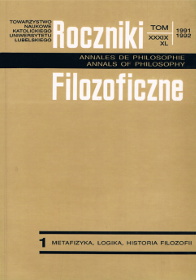Klasyczność filozofii klasycznej
Abstrakt
The philosophers of the Lublin School of Philosophy (Catholic University of Lublin) are sometimes identifying their pattern of doing philosophy as the classical philosophy. But this term is either self-evident or indisputable. The paper demonstrates the different traditions, meanings and criteria of the terms „classical” and „classical philosophy” in the history (of philosophy) and in the publications of the philosophers of the Lublin School of Philosophy: M. A. Krąpiec, S. Kamiński and A. B. Stępień.
As the study shows the term „classical philosophy” is dynamic and ambiguous, stretching dialectically between its historical and systematic meanings. The philosophers mentioned above heterogeneously use the term „classical philosophy” in a broader or narrower sense, calling classical both the entire philosophy and the particular philosophical disciplines, principally the philosophy of being. The term „classical philosophy” means here the tradition of Aristotle through St. Thomas to E. Gilson and is not only descriptive but evaluative. The classical in philosophy is some „hard core” that runs through the history of philosophy, not distorted by the outward deviations. It is not easy to specify exactly the conditions under which the philosophers in Lublin call themselves classic. The term „classical philosophy” itself doesn't fix its indices. Some of the criteria are: genetic empiricism and realism, rationalism and intellectualism, existentialism, objectivism, transcendentalism and analogy, epistemic maximalism, autonomy, foundationalism and antidogmatism. Each of this criteria is controversial and requires further explanation. The closest relationship seems to be between the classical philosophy and the classical definition of truth.
Copyright (c) 1992 Roczniki Filozoficzne

Utwór dostępny jest na licencji Creative Commons Uznanie autorstwa – Użycie niekomercyjne – Bez utworów zależnych 4.0 Międzynarodowe.





